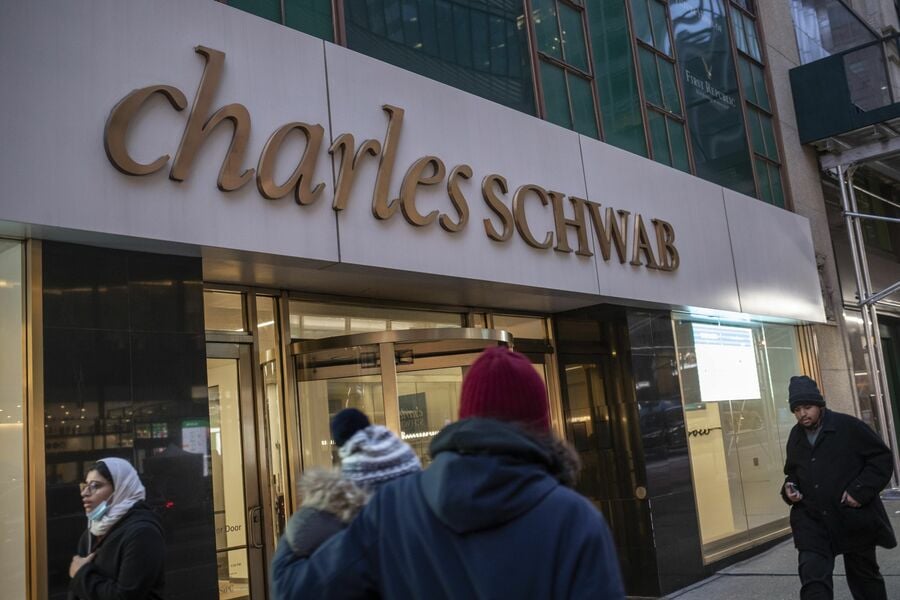

Charles Schwab Corp. rebounded from a record intraday decline after the online brokerage sought to reassure investors that it has sufficient liquidity to handle any volatility following the collapse of Silicon Valley Bank, or SVB.
Shares of Westlake, Texas-based Schwab dropped 9.6% to $53.05 at noon in New York after earlier plunging as much as 23%.
The brokerage, which also owns a bank, has “ample liquidity” to meet client withdrawals, Piper Sandler analyst Rich Repetto said in a note to clients Monday. Schwab’s deposits are largely from retail brokerage clients not prone to “the level of rapid deposit outflows” that hit Silicon Valley Bank because of its commercial clients.
Schwab, like SVB, has a large investment securities portfolio and is sitting on significant paper losses in its held-to-maturity books. The firm transferred almost $189 billion of securities to a held-to-maturity basis last year, and had $14 billion in unrealized losses on that portfolio of agency mortgage-backed securities at year-end. Unlike SVB, however, most of the Schwab customer deposits are insured.
“Given our significant access to other sources of liquidity there is very little chance that we’d need to sell them prior to maturity,” Chief Financial Officer Peter Crawford said in a statement.
Founder and Co-Chairman Charles Schwab and Chief Executive Officer Walt Bettinger said in a separate statement that the firm has a broad base of customers and capital in excess of regulatory requirements.
“Schwab’s long-standing reputation as a safe port in a storm remains intact, driven by record-setting business performance, a conservative balance sheet, a strong liquidity position, and a diversified base of 34 million-plus account-holders who invest with Schwab every day,” the executives wrote.
The shares started to weaken last week as depositors pulled money from SVB Financial Group’s Silicon Valley Bank, leading investors to scrutinize other financial firms. Schwab’s bank sweep accounts have experienced outflows this year as clients seek higher yields.
The company said it has access to about $100 billion of cash flow, more than $300 billion of incremental capacity with the Federal Home Loan Bank and other short-term facilities, and that more than 80% of deposits at its bank are insured by the Federal Deposit Insurance Corp.
The outflows were about $5 billion lower in February than in January, and Schwab expects the cash flow movements to abate, Crawford said.

The looming threat of federal funding cuts to state and local governments has lawmakers weighing a levy that was phased out in 1981.

The fintech firms' new tools and integrations address pain points in overseeing investment lineups, account monitoring, and more.

Canadian stocks are on a roll in 2025 as the country prepares to name a new Prime Minister.

Carson is expanding one of its relationships in Florida while Lido Advisors adds an $870 million practice in Silicon Valley.

The approval of the pay proposal, which handsomely compensates its CEO and president, bolsters claims that big payouts are a must in the war to retain leadership.
RIAs face rising regulatory pressure in 2025. Forward-looking firms are responding with embedded technology, not more paperwork.
As inheritances are set to reshape client portfolios and next-gen heirs demand digital-first experiences, firms are retooling their wealth tech stacks and succession models in real time.
